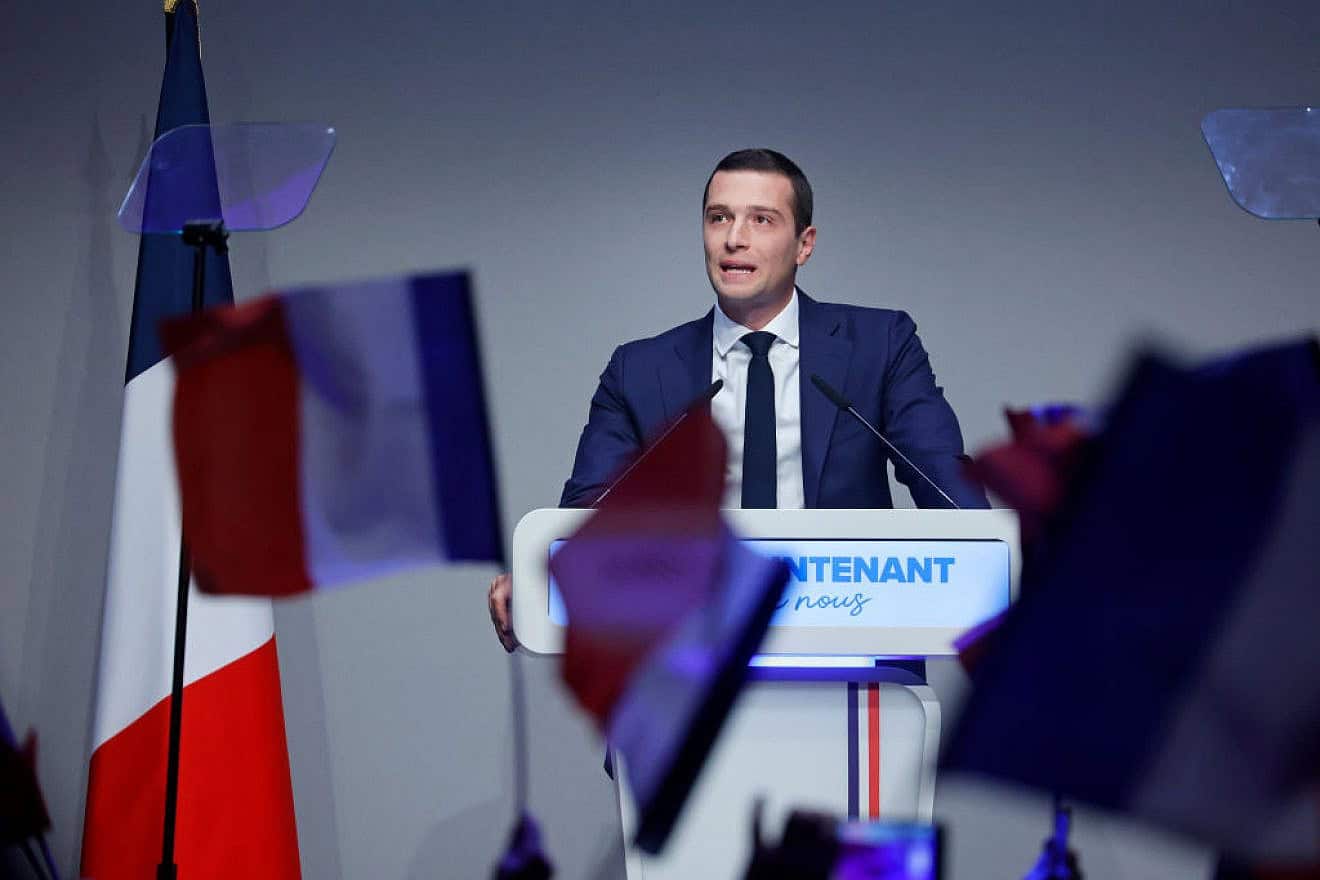The first round of France’s “snap” elections on June 30 resulted in a significant win for the “far-right” party Rassemblement National (RN), which garnered about 33.15% of the vote.
RN’s victory has been shocking to some but, as a Jew living in France, I see it as a response to France’s current social and economic challenges and the right choice for Jews. Recent events, coupled with my personal experience, shaped my view.
My perspective was formed partly by my mandatory civic integration class upon moving to France. Like all immigrants, I was required to take four civics courses. The class was diverse, with people from Mexico, Pakistan, Mauritius Island, Algeria, Morocco, Tunisia and America.
The courses covered different aspects of French life, including housing, the national healthcare system and understanding fundamental rights and liberties, such as liberté de parole (freedom of speech).
During one session, the teacher, asked, “If I draw a cartoon of Muhammad, is that allowed?” To my surprise, four women in the class, all from Morocco, Algeria and Tunisia, including a finance professional with a graduate degree, argued that such a cartoon violated their “religious liberty.”
The debate lasted for 10 minutes until the teacher, who himself had a North African surname, solemnly concluded, “Good luck in France.” When it came time to sign a document stating that we, as new arrivals in France, would respect France’s values and laws, one woman complained that she should not have to respect homosexuals.
This experience was an eye-opener, revealing attitudes that I hadn’t expected to encounter so openly. The behavior I observed in that class, along with alarming events and economic issues over the past several years, likely contributed to RN’s recent victory. France has a significant immigrant population and many of France’s new arrivals use social services at higher rates than their non-immigrant counterparts and, overall, struggle to integrate.
A 2017 study showed that 31% of immigrant households use France’s public housing compared to 13% of native-born French. According to a 2019 study, 40% of men ages 18-30 who are in France illegally use taxpayer-funded health insurance specifically for illegal immigrants.
In other words, newer arrivals to France benefit from France’s generous social safety net before contributing to it. In a country with one of Europe’s highest tax rates, this does not bode well for the French economy. One can understand why the French and I, as an American living here, are concerned about our economic future—and RN offers solutions.
RN’s platform includes a commitment to “Reserve social assistance for French people and make access to solidarity benefits conditional on five years of work in France.” As with all politicians, whether or not this will happen remains to be seen. As someone who recently immigrated to France, I have no issue with the idea of receiving social assistance only after paying into the system from which I benefit.
France’s economic problems pale in comparison to its social and cultural challenges.
In late 2023, a controversy erupted in French public schools over the abaya, a traditional Islamic dress, which is forbidden in public schools under France’s laïcité (secularism) laws. Some families refused to comply and sent their daughters to school wearing abayas. This may seem surprising to Americans, but France’s secularism prohibits religious displays in government and public spaces, including public schools.
Then there is the tragic and infamous Samuel Paty case, in which a schoolteacher was beheaded after showing a cartoon of Muhammad in a school. The murderer was an 18-year-old refugee from Chechnya who was previously unknown to authorities.
Incidents like these, ranging from violating laïcité to bringing violence into the classroom, have been happening for nearly 20 years. It stands to reason that the French and French Jews want something done to stop it.
Jordan Bardella, the leader of RN, has been outspoken about the alarming issue of political Islam and the need for laïcité. He said in Le Figaro, “The time has come to defend secularism against its real enemies, not the Christmas nativity scenes but the Islamist preachers who know nothing other than the law of their prophets.”
Indeed, these are strong words, but in the wake of stabbings and murders in schools over secularism, French voters want leadership to enforce France’s secularism laws and make schools safe for students and teachers of all backgrounds.
I am Jewish and believe that enforcing existing laws equally, regardless of religion, is not a “far-right” stance; it’s about defending Western values and defend them we must.
Last summer, violent riots erupted in Paris when a minor driving a stolen car without a license refused many police orders to stop. After a car chase that wound its way through Paris, an officer shot the driver. In the days following, a northern suburb of Paris rioted and looted for days.
Crime statistics are even more telling. An INSEE study states, “In 2019, 82% of people accused by the police and gendarmerie declared themselves French and 18% foreign while they represent respectively 93% and 7% of the population in France.” In short, 18% of those committing crimes are foreigners but foreigners make up only 7% of the population.
When looking at the car chase incident and crime statistics alongside France’s social and economic challenges, many of which come from immigrant communities, one can hardly blame the French for voting for a promise to curb immigration, restore economic prosperity and rebuild social cohesion.
But RN is not without flaws.
The biggest one is, of course, party leader Marine Le Pen’s father, Jean-Marie Le Pen. He once said that the fact that six million Jews were murdered in the Holocaust is a minor detail—an offensive viewpoint tantamount to Holocaust denial. One of RN’s founders, Pierre Bousquet, was a member of the Waffen-SS, the paramilitary Nazi combat unit. Bousquet died in 1991.
Despite its problematic origins, RN enjoys popularity among the French, as evidenced by their victory in European Union parliament elections and recent victory in the first round of “snap” elections.
Americans tut-tutting at France’s embrace of RN would be well-served to consider that Bousquet died 30 years ago, while Jean-Marie Le Pen’s Holocaust statement was made in 1987. As recently as October 2023, Jean-Luc Mélenchon, leader of the far-left Nouvelle Union Populaire Écologique et Sociale Party, refused to condemn Hamas.
He said on social media, “All the violence unleashed against Israel and in the Gaza Strip only produces [more violence].” On the other hand, RN’s leader, Jordan Bardella, following the October 7 massacre, expressed “The most complete, unequivocal and unreserved solidarity with Israel.”
French Jews have taken note.
According to a June 6 survey, 92% of French Jews believe that Mélenchon’s party is the leading party of antisemitism. Only 49% thought the same of RN.
As an American Jew married to a French Jew, I am less worried about RN’s provenance and more concerned with the current government failing to address France’s immigration crisis and the French left that won’t condemn antisemitism. If Sunday’s elections are any indicator, French voters agree with me.

























